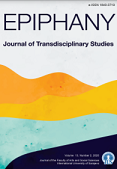THE ABILITY OF EMOTION RECOGNITION ASSOCIATES WITH RESPONSIVE BEHAVIORS RELATED TO COVID-19 AMONG TURKISH INDIVIDUALS
THE ABILITY OF EMOTION RECOGNITION ASSOCIATES WITH RESPONSIVE BEHAVIORS RELATED TO COVID-19 AMONG TURKISH INDIVIDUALS
Author(s): Ünal-Aydın Pınar, Orkun Aydın, Canahmet BozSubject(s): Psychology, Clinical psychology, Behaviorism, Health and medicine and law
Published by: International University of Sarajevo
Keywords: COVID-19; emotion recognition; preventive behavior; outbreak; pandemic; corona virus;
Summary/Abstract: It has been shown that emotions such as fear and anger may play a role in responsive and preventive behaviors of individuals during the COVID-19 outbreak. Accurate interpretation of such emotions may contribute to early management of disease spread measures by eliciting avoidance from the risky situations. In this study, we aimed to examine the relationship between emotion recognition (ER) ability, responsive and preventive behaviors related to the pandemic among healthy individuals. 520 adult participants were recruited for the study. A sociodemographic data form, a personal information form including responsive and preventive behaviors related to COVID-19, and the Reading the Mind from The Eyes Test (RMET) were applied to the participants via online platform. The vast majority of the participants indicated COVID-19 as a dangerous disease, and they stated their avoidance from outside gatherings and public transportation. Additionally, it was found that those who can define neutral emotions better, worry about the disease and take a more active role in responsive behaviors such as eating out and avoiding public places. It has been shown that individuals who are more effective with recognition of negative and neutral emotions during the outbreak are more active in risk-avoiding behaviors during COVID-19. Attempts to increase emotion recognition skills can be beneficial for both healthy individuals and people with mental illness in the early development of preventive behavior.
Journal: Epiphany. Journal of Transdisciplinary Studies
- Issue Year: 13/2020
- Issue No: 2
- Page Range: 26-44
- Page Count: 19
- Language: English

